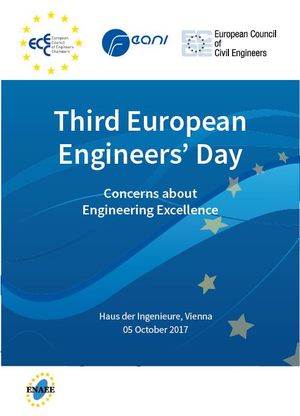What is “engineering excellence”? Does the EU need it? Will it be available in the future?
What are encouragements and hindrances for its occurrence?
About 150 participants from all over Europe discussed this question very passionately at the 3rd European Engineers Day in Vienna on 5 October 2017:
Most of them fully agreed to what Commissioner Violeta Bulc stated in her video message: There is indeed a need for engineering excellence in Europe, as transport – her field of competence – clearly shows. It is a preliminary requirement for building transport infrastructure.

Speakers from various backgrounds approached the question of securing the availability of engineering excellence in the future from different angles:
Hubert Gambs, responsible Director for the modernization of the Single Market in the European Commission stressed the importance of the quality of engineering services. At the same time the aim of the Commission is to reduce regulation to the necessary minimum in order to enhance economic growth and – by an increase of mobility – also the availability of engineering services.
Leo Chini, Professor at the University of Economics and Business in Vienna criticized this approach due to its undifferentiated treatment of different forms of services and regards deregulatory measures for regulated professions as a potential hazard to engineering excellence and – as studies in Austria have shown – not efficient in reaching the European Commission’s economic targets.
Jean-Louis Marchand, President of the European Construction Industry Federation (FIEC) as well as Maxime Cerutti, Director of Social Affairs at Business Europe, put a strong focus on the problem of the shortage of employees in engineering companies and on providing the right engineering skills to better meet companies’ needs. The high level engineering education as an important column of engineering excellence was also the focus of Ioannis Golias, Rector of the National Technical University of Athens. Also the panellists – Michaela Ragoßnig-Angst, an Austrian surveying engineer, Rudolf Kolbe, President of the European Council of liberal professions and member of the EESC, Bernard Remaud, President of ENAEE and Paul Coughlan from ICE agreed on the importance of education for engineering excellence. Their discussion focused on possible ways to attract young people and also migrants and refugees to such engineering educations.
Philippe de Buck, Former Director of Business Europe and EESC member approached the question on a broader basis. He questioned if the current policies of the EU are overall adequate to deal with challenges and chances of the changing world and raised the question of how opportunities for engineers could be better exploited.
In his final statement, ECEC President Remec summarised that there seem to be five columns on which engineering excellence is based: high level education and continuous professional development, practice, ethical behaviour, control mechanisms. Even if they cannot guarantee engineering excellence, without them the occurrence of engineering excellence is very, very rare. And the availability of engineering excellence in Europe should not be a matter of chance.
Background:
The “3rd European Engineers’ Day” was an event co-organized by a number of European Engineering Organizations on a regular basis: The European Council of Engineering Chambers (ECEC), the European Federation of National Engineering Associations (FEANI) and the European Council of Civil Engineers (ECCE) together with the European Network for Accreditation of Engineering Education (ENAEE). These organizations represent a wide variety of European Engineering branches and a high number of European Engineers.
You can view / download the photos of the event by clicking the link below:
https://www.flickr.com/photos/144875381@N07/albums/72157687108469090
Please note that when using/publishing the photos, please add a clear copyright notice: © Jana Madzigon